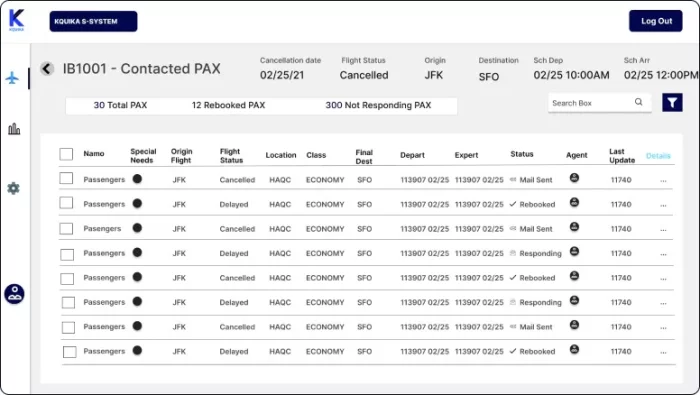

KQUIKA, INC
Queens, New York (NY), United States
Aerospace
Products & Services
People
About
Products & Services
Predictive Maintenance
Kquika, Inc
At Kquika, Inc, we are building a system that detects mechanical failures to aircraft components and systems.
The first problem was that we wanted to reduce maintenance costs by predicting mechanical failures before they happen in aircraft systems and components.
We came up with a solution for this problem, but instead of moving on to another project, we thought it would be interesting to see if our solution could detect possible failures in other machinery that use similar components as aircraft systems and components.
We then started working on the related concept of detecting possible mechanical failures in aircraft systems and aircraft components.
It was therefore fortuitous when we came across similar problems in aerospace engineering as well as the related concept of detecting possible mechanical failures using similar data from other machinery using similar components as aircraft systems and components.
With this background information on our solution, we will now go into more detail about how our system works for detecting possible failures in aircraft systems to make sure that you fully understand the work that we do here at Kquika.
These objects could be aircraft systems or components or other machinery that uses similar parts as aircraft systems like engines and landing gears.
We believe that our solution can reduce aircraft maintenance costs and increase safety by predicting failures of mechanical parts before they happen in planes and other aircraft systems and components.
This would significantly reduce maintenance costs on aircraft systems and components, as well as enhance safety in aircraft by detecting possible mechanical failures before they happen.
The first problem was that we wanted to reduce maintenance costs by predicting mechanical failures before they happen in aircraft systems and components.
We came up with a solution for this problem, but instead of moving on to another project, we thought it would be interesting to see if our solution could detect possible failures in other machinery that use similar components as aircraft systems and components.
We then started working on the related concept of detecting possible mechanical failures in aircraft systems and aircraft components.
It was therefore fortuitous when we came across similar problems in aerospace engineering as well as the related concept of detecting possible mechanical failures using similar data from other machinery using similar components as aircraft systems and components.
With this background information on our solution, we will now go into more detail about how our system works for detecting possible failures in aircraft systems to make sure that you fully understand the work that we do here at Kquika.
These objects could be aircraft systems or components or other machinery that uses similar parts as aircraft systems like engines and landing gears.
We believe that our solution can reduce aircraft maintenance costs and increase safety by predicting failures of mechanical parts before they happen in planes and other aircraft systems and components.
This would significantly reduce maintenance costs on aircraft systems and components, as well as enhance safety in aircraft by detecting possible mechanical failures before they happen.
Disruption and Recovery Platform
Kquika, Inc
When such occur on a single day it is no big deal, but when faced with back-to-back disruptions that include delayed flights, canceled flights, and overbooking, the real problem occurs: passenger loyalty breaks down.
Kquika, Inc is developing a machine learning-based solution that will help aircraft operators in the airline industry prevent flight disruption, eliminate passenger loyalty losses and ensure that airlines can continue operating at a profit
By using Kquika’s machine learning-based notification system, airlines will be able to recover from disruptions much faster, reduce passenger loyalty losses and avoid canceling flights altogether whenever possible
The system would allow airlines to recover from disruption much faster, reducing passenger loyalty losses and avoiding cancellations altogether whenever possible
The solution would allow airlines to engage in continuous operations during disruption hours (i.e., at night or during bad weather) and recover from disruptions much faster, reducing passenger loyalty losses and avoiding cancellations altogether whenever possible
When a weather issue is resolved, the system will automatically engage in finding an alternative flight where possible and offer them up as possibilities of rebooking the same passengers on another flight that is still in service or offering them seats on other airlines where possible
The solution would allow airlines to recover from disruptions much faster, reducing passenger loyalty losses and avoiding cancellations altogether whenever possible
When a ground delay is resolved, the system will automatically engage in finding an alternative flight and offer them up as possibilities of rebooking the same passengers on another flight that is still in service or offering them seats on other airlines where possible
The final use case is for passengers mainly affected by overbooking but also passengers that are trying to find a flight home when a delayed flight causes their departure time to be extended beyond their original arrival time
If rebooking the same passenger on another flight within 24 hours would be beneficial (i.e., reducing passenger loyalty losses), then Kquika will do so without any additional cost and any disruption to the other passengers waiting in line for rebooking.
Kquika, Inc is developing a machine learning-based solution that will help aircraft operators in the airline industry prevent flight disruption, eliminate passenger loyalty losses and ensure that airlines can continue operating at a profit
By using Kquika’s machine learning-based notification system, airlines will be able to recover from disruptions much faster, reduce passenger loyalty losses and avoid canceling flights altogether whenever possible
The system would allow airlines to recover from disruption much faster, reducing passenger loyalty losses and avoiding cancellations altogether whenever possible
The solution would allow airlines to engage in continuous operations during disruption hours (i.e., at night or during bad weather) and recover from disruptions much faster, reducing passenger loyalty losses and avoiding cancellations altogether whenever possible
When a weather issue is resolved, the system will automatically engage in finding an alternative flight where possible and offer them up as possibilities of rebooking the same passengers on another flight that is still in service or offering them seats on other airlines where possible
The solution would allow airlines to recover from disruptions much faster, reducing passenger loyalty losses and avoiding cancellations altogether whenever possible
When a ground delay is resolved, the system will automatically engage in finding an alternative flight and offer them up as possibilities of rebooking the same passengers on another flight that is still in service or offering them seats on other airlines where possible
The final use case is for passengers mainly affected by overbooking but also passengers that are trying to find a flight home when a delayed flight causes their departure time to be extended beyond their original arrival time
If rebooking the same passenger on another flight within 24 hours would be beneficial (i.e., reducing passenger loyalty losses), then Kquika will do so without any additional cost and any disruption to the other passengers waiting in line for rebooking.
About
WE ARE COMMUNITY-ORIENTED
On the news, we frequently hear about flight delays: planes are diverted, planes are canceled. These delays can throw your plans off track and cause major frustration for you and your fellow passengers.
Previously, you could only check airline websites or call the airlines to find out what was causing your delay. But there is now an easier way! At Kquika, we discovered a way to assist airline enterprises in resolving flight delay issues and ultimately becoming customer-centric through predictive maintenance software. We developed products that assist them in saving money by predicting maintenance before it becomes costly, as well as assisting their customers by alerting them in advance of any delays that may affect their travel plans.
OUR MISSION
Kquika's mission is to propel and shape the aviation industry to a higher level. We will assist airlines in three ways:
1. Lower maintenance costs by monitoring aircraft in real-time and predicting maintenance requirements so that they can be addressed before they become costly.
2. Increase revenue by ensuring that their passengers have the best possible travel experience with the products and services we provide.
3. Be more customer-centric
On the news, we frequently hear about flight delays: planes are diverted, planes are canceled. These delays can throw your plans off track and cause major frustration for you and your fellow passengers.
Previously, you could only check airline websites or call the airlines to find out what was causing your delay. But there is now an easier way! At Kquika, we discovered a way to assist airline enterprises in resolving flight delay issues and ultimately becoming customer-centric through predictive maintenance software. We developed products that assist them in saving money by predicting maintenance before it becomes costly, as well as assisting their customers by alerting them in advance of any delays that may affect their travel plans.
OUR MISSION
Kquika's mission is to propel and shape the aviation industry to a higher level. We will assist airlines in three ways:
1. Lower maintenance costs by monitoring aircraft in real-time and predicting maintenance requirements so that they can be addressed before they become costly.
2. Increase revenue by ensuring that their passengers have the best possible travel experience with the products and services we provide.
3. Be more customer-centric
Add Attachment

Share
Recent Chats
Share via email
Future: handle WhatsApp here
Future: handle LinkedIn here
Future: handle Twitter here
SUBMENU HERE
Share via Chat
Copy Link

